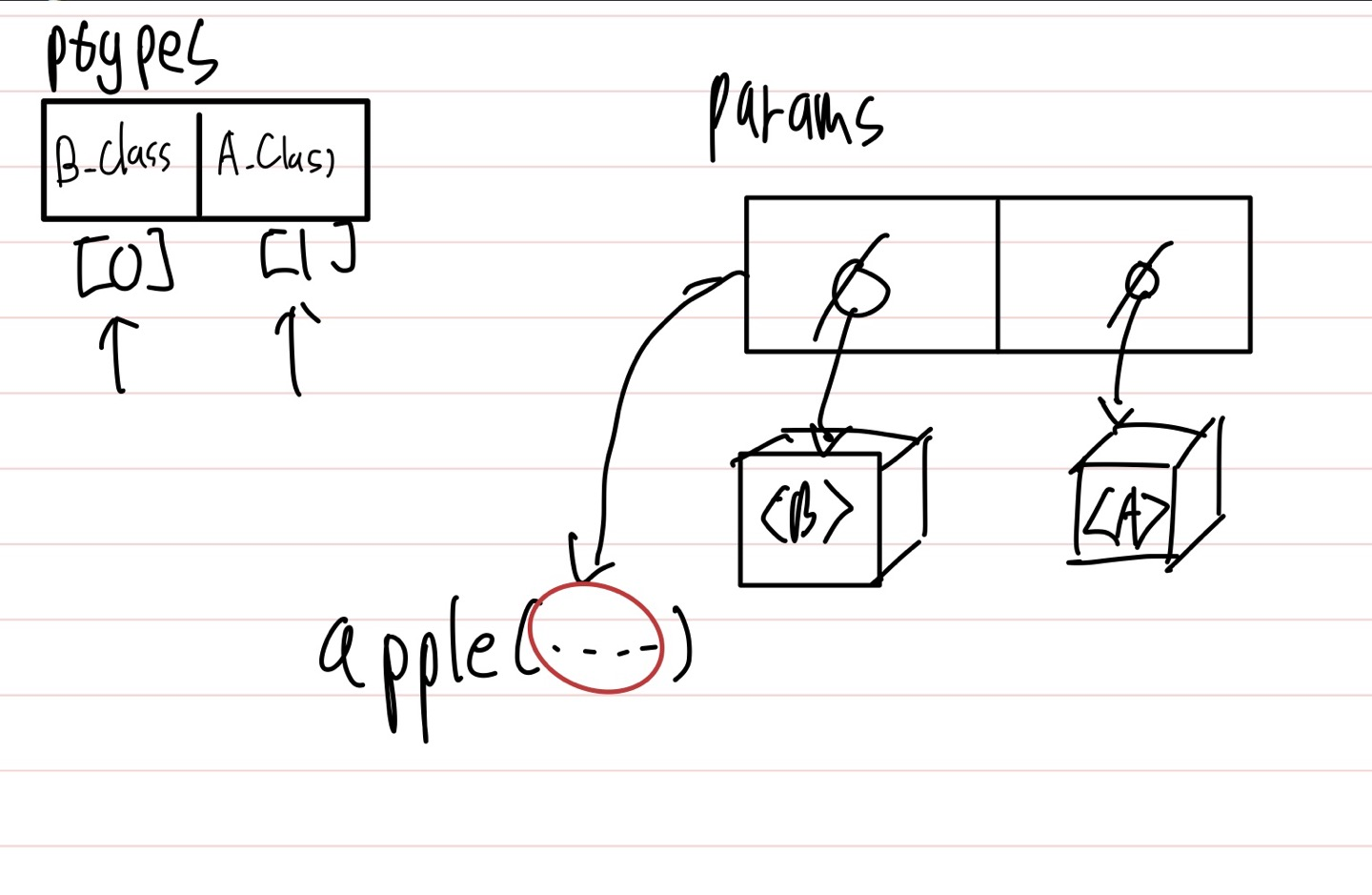모델2 아키텍쳐를 이용한 게시판 코딩 방법의 또 다른 기법들을 알아봤다.
먼저 기존 이용하던 가변 파라미터를 이용해 Method로부터 invoke를 이용하는 방법이 아닌 배열을 이용한 방법이다
1 2 3 4 5 6 7 8 9 10 11 12 13 14 15 16 17 18 19 20 21 22 23 24 25 26 27 28 | class Temp530 { public void apple( A t , B j) { System.out.println( "apple " + t + "," + j ); } } public class Test530 { public static void main( String[] args ) throws Exception { Class<?> cls = Class.forName("banana.Temp530"); Object obj = cls.newInstance(); Method mtd = cls.getMethod( "apple", A.class, B.class ); mtd.invoke( obj, null , null ); // ----------------------------------------------------- // 1. 가변 파라미터를 이용한 호출 , 2. 배열을 이용한 호출 Class<?>[] ptypes = new Class<?>[2]; ptypes[0] = A.class; ptypes[1] = B.class; Method mtd2 = cls.getMethod("apple", ptypes ); Object[] params = new Object[2]; params[0] = null; params[1] = new B(); mtd2.invoke( obj , params ); } } | cs |
Test530의 윗부분은 기존의 방법이고, 아랫부분은 배열을 이용한 다른 방법이다. apple에 맞춰 2개짜리 배열 ptypes 를 만들고 각각에 매개변수인 A와 B의 Class 를 대입한다. 그리고 위의 방법에서 class 를 직접 입력한 것과 다르게 대입된 배열을 그대로 입력한다. 그리고 매개변수의 class에 맞도록 인스턴스를 생성해 Object의 배열에 대입하고 getMethod한 mtd2의 .invoke에 매개변수로 사용해서 함수를 호출한다.
1 2 3 4 5 6 7 8 9 10 11 12 13 14 15 16 17 18 19 20 21 22 23 24 25 26 27 28 29 30 31 32 33 | class Temp531 { public void apple( B t , A j) { System.out.println( "apple " + t + "," + j ); } } public class Test531 { public static void main( String[] args ) throws Exception { Class<?> cls = Class.forName("banana.Temp531"); Object obj = cls.newInstance(); Method[] mtds = cls.getMethods(); for( Method mtd : mtds ) { if( mtd.getName().equals("apple") ) { // System.out.println( mtd ); Class<?>[] ptypes = mtd.getParameterTypes(); for( Class<?> ptype : ptypes) { System.out.println( ptype ); } Object[] params = new Object[ ptypes.length ]; for( int i = 0 ; i < ptypes.length ; i++ ) { if( ptypes[i] == A.class ) { params[i] = new A(); } else if( ptypes[i] == B.class ) { params[i] = new B(); } } mtd.invoke( obj, params ); } } } } | cs |

다음과 같이 for 문에서 ptypes에서 비교되는 결과에 따라 params의 배열이 가리키고 있는 항목 중에서 대입될 인스턴스가 결정되고, 매개변수로 삼아 apple을 호출하게 된다.
RequestParam
1 2 3 4 5 6 7 8 9 10 11 12 13 14 15 16 17 18 19 20 21 22 23 24 25 26 27 28 29 30 31 32 33 34 35 36 37 38 39 40 41 42 43 44 45 46 47 | class Temp532 { public void apple( B j , @Param("X") A t, @Param("Z") Integer k ) { System.out.println( "apple " + t + "," + j ); } } public class Test532 { public static void main( String[] args ) throws Exception { Class<?> cls = Class.forName("banana.Temp532"); Object obj = cls.newInstance(); Method[] mtds = cls.getMethods(); for( Method mtd : mtds ) { if( mtd.getName().equals("apple") ) { System.out.println( mtd ); Class<?>[] ptypes = mtd.getParameterTypes(); Annotation[][] pas = mtd.getParameterAnnotations(); // 각 매개변수별 어노테이션의 갯수 System.out.println( pas[0].length ); System.out.println( pas[1].length ); System.out.println( pas[2].length ); //두번째로 선언된 A t 앞에 어노테이션이 적용됐는지 ? for( int i = 0 ; i < pas[1].length ; i++ ) { System.out.println( pas[1][i] ); System.out.println( pas[1][i].annotationType() == Param.class ); // 어노테이션의 값 추출하기 Param temp = (Param)pas[1][i]; System.out.println( temp.value() ); } Param annot = (Param)getAnnotationInParam( mtd, 2, Param.class ); System.out.println( annot.value() ); Param annot2 = (Param)getAnnotationInParam( mtd, 0, Param.class ); System.out.println( annot2.value() ); } } } public static Annotation getAnnotationInParam( Method mtd , int idx, Class<?> annot ) { Annotation[][] pas = mtd.getParameterAnnotations(); for( int i = 0 ; i < pas[idx].length ; i++ ) { if( pas[idx][i].annotationType() == annot ) { return pas[idx][i]; } } return null; } } | cs |
1 2 3 4 5 6 7 8 9 10 11 12 13 14 15 16 17 18 19 20 21 22 23 | @RequestMapping("/del2.do3") public String del2( @RequestParam("no") String no ) throws Exception { if( no == null || no.equals("")) { return "redirect:list.do?ecode=invalid_no"; } Bang06DAO dao = new Bang06DAO_MariaImpl(); Bang06VO po = new Bang06VO(); po.setNo( Integer.parseInt(no) ); Bang06VO vo = dao.findByPK(po); int uc = dao.delByPK(po); if( uc > 0 && vo.getFsn() != null ) { File file = new File( Util.uploadDir() + vo.getFsn() ); if( file.exists() ) { file.delete(); } } return "redirect:list.do3"; } | cs |
1 2 3 4 5 6 7 8 9 10 11 12 13 14 15 16 17 18 19 20 | else { RequestParam rp = (RequestParam)getAnnotationInParam( mtd, i , RequestParam.class ); if( rp != null ) { String pn = rp.value(); if( ptypes[i] == String.class ) { params[i] = request.getParameter(pn); } else if( ptypes[i] == Integer.class ) { try { params[i] = Integer.parseInt( request.getParameter(pn) ); } catch( Exception e ) { params[i] = null; } } continue; } } | cs |

